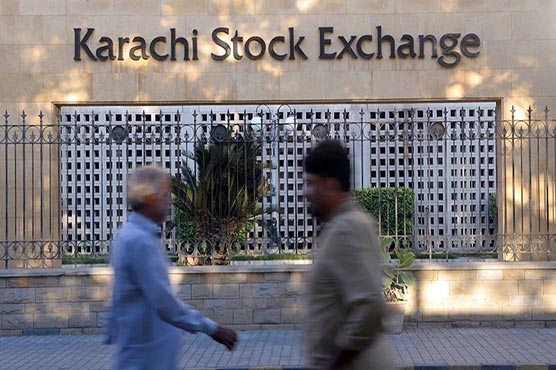Stock market trades almost flat amid absence of triggers

The Index opened at 40,660.52 today.
KARACHI (Dunya News) – The stock market has been trading nearly flat on Thursday amid absence of positive triggers despite yesterday’s fine session amid reports of hopeful positive outcome from the FATF meetings in Paris for Pakistan which restored some of investors’ confidence.
The benchmark KSE 100-Share Index reached 40,561.50 points after losing 13 points as of 01.09pm. The Index opened at 40,660.52 today.
After a considerable declining trend in the previous weeks, the apex of the day remained 40,697.05 while the low was 40,451.01 so far.
Yesterday, the market closed at 40,574.52 after gathering 399 points. Yesterday’s rally came following confirmed reports from sources that Pakistan will not be put in the black list, but will remain in the grey list till October 2020 i.e. the country is given more time to implement effectively the global illicit financing watchdog’s 27 recommendations about the anti-money laundering and combating financing of terrorism (AML/CFT) mechanism.
In previous weeks, the market kept struggling for its sustainability when confusion and uncertainty surrounded investors until late Friday when the IMF, in its concluding remarks affirmed that Pakistan had been successful in completing the "structural benchmarks" as well as in meeting "all end-December performance criteria" which had been set for the implementation of $6 billion Extended Fund Facility programme.
Previously, other persisting factors in the decline of stock market were the FATF concerns and large suspension of imports from China, which had been hammering the stock market, following the outbreak of COVID-19. Besides, strife political disagreements between coalition parties in the government until some of them were settled in meetings with the ruling PTI.
Since mid-January, investors have been adopting extremely cautious behaviour after more headlines cover mounting deaths due to coronavirus taking full hold, a plunge in global crude oil prices, unchanged main policy rate by the State Bank of Pakistan at 13.25 percent for the next two months and political uncertainty in the country.
The SBP in the latest monetary policy statement kept the interest rate unaltered and pushed selling in the leveraged sectors such as cement and steel. Concerns over higher than expected reading of inflationary pressures and political uncertainty sparked by coalition partners of the government also kept investors away from the market.
China stimulus hints, slowing spread of virus lift stocks
A decline in the number of new coronavirus cases in China and mounting expectations for more policy stimulus boosted global stock markets on Wednesday, helping ease some of the alarm caused by an Apple revenue warning.
China posted the lowest daily rise in new coronavirus cases since Jan. 29, helping to lift the offshore-traded yuan to two-week highs against the dollar and pushing the yen to a one-month low .
Many view Chinese data on the virus with scepticism, but sentiment was lifted by a Bloomberg report that Beijing was considering cash injections or mergers to bail out airlines hit by the virus.
Those steps would come after this week’s cut in the medium-term lending rate, which has fed expectations for a reduction in the benchmark loan prime rate.
A pan-European equity index rose 0.4% to test recent record highs and futures indicated a stronger open for Wall Street.
Earlier, an MSCI index of Asian shares outside Japan rose 0.5%. Japan’s Nikkei index gained almost 1%, helped by the yen’s retreat.
Chinese mainland shares closed in the red, however.
Edward Park, chief investment officer at Brooks Macdonald, cited President Xi Jinping’s latest commitment to meeting 2020 growth targets.
“This in itself implies there will be more fiscal and monetary stimulus,” Park said. “That’s the real carrot for markets today.”
Tuesday’s U.S. Empire manufacturing survey also reassured investors the world’s biggest economy was in good shape, he said. That somewhat tempered worries caused by Apple’s warning it might miss sales targets because of pressure on its supply chains.
Market fears still kept gold trading above $1,600 an ounce and U.S. 10-year Treasury yields some 35 basis points below where they started 2020.
“There is some nervousness that economic data outside the United States is not amazing,” Park said.
China, the world’s second-largest economy, is struggling to get manufacturing back online after severe travel restrictions were imposed to contain the coronavirus. Japanese exports fell for the 14th straight month in January, data showed.
Growth worries were reflected in a dismal German investor sentiment survey and the U.S. Treasury curve, where yields on three-month bills rose above yields on 10-year notes — an inversion that’s been a fairly reliable recession predictor in the past.
The yield on three-month bills stood at 1.5949%, above the 10-year yield of 1.5661%.
Investors are waiting to see what other growth-supportive measures could be introduced, particularly in the euro zone. They will also keep an eye on the minutes from the U.S. Federal Reserve’s last meeting.
The Fed has signalled that it’s keeping an eye on the coronavirus impact but has no intention of cutting interest rates anytime soon. Many analysts reckon it could be forced to change its mind.
“Given the risks we see to both growth and inflation falling short of expectations this year, we still expect the Fed’s view on the need for additional rate cuts to shift later this year,” NatWest analysts told clients, adding they were “not at this time removing rate cuts from our forecast.”
But the contrast between euro zone and U.S. economic indicators are weighing on the euro, which has reached a three-year low versus the dollar, though it rose back above the $1.08 level it breached on Tuesday for the first time since 2017 .
Brent crude futures rose around 0.7% to $58.12 a barrel, as a reduction in supply from Libya offset concerns about weaker Chinese demand.

